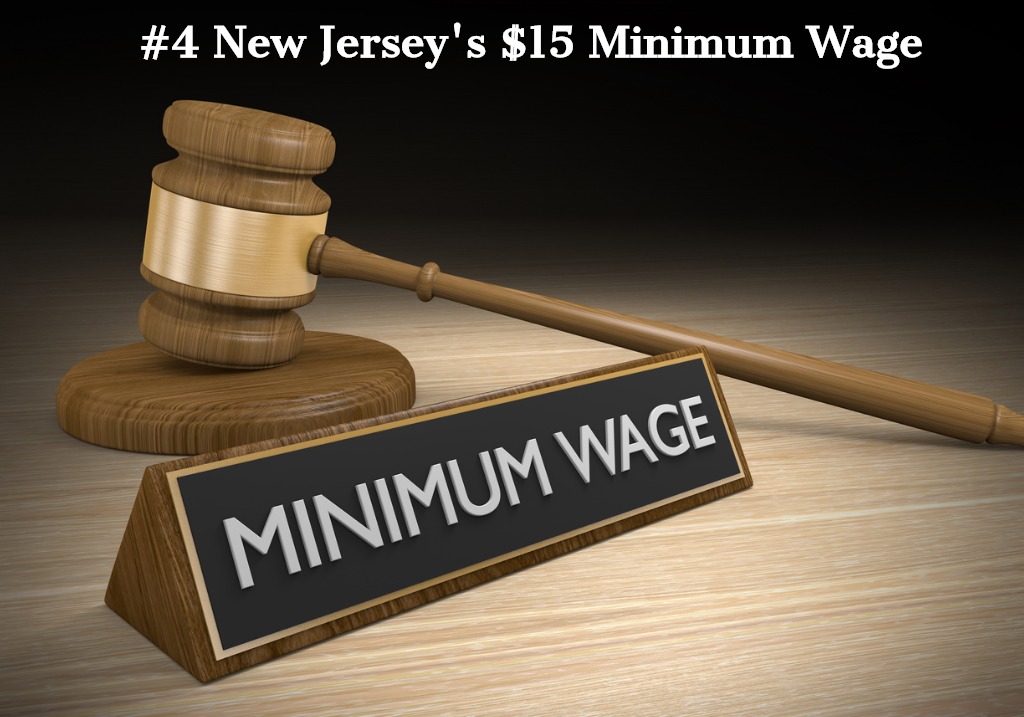#4 Genova Burns’ 30th Anniversary Countdown of the Most Influential Cases, Events and Laws
New Jersey's $15 Minimum Wage Law #4
January 6, 2020
In February 2019, New Jersey Governor Phil Murphy signed legislation that will gradually raise New Jersey’s minimum wage to $15 an hour for most workers by 2024, making it the fourth state to approve such a policy. The Garden State joined California, Massachusetts, New York, and Washington D.C. in raising the minimum wage to that level, and was followed by Illinois, Maryland, and Connecticut to round out 2019. The legislation, one of Murphy’s signature campaign promises, makes New Jersey the fourth largest state, by population, to enact the $15 target minimum wage.
“New Jersey has become part of the lead pack of states nationwide that are on a clear path to a $15 per hour minimum wage target. This ensures that the state’s minimum wage workforce receives a living wage, while giving employers time to adjust their operations to compensate for these increases over time,” said Brian M. McKeegan, Associate at Genova Burns. “With the expectation that these annual increases, through 2024, could affect as many as one million members of the New Jersey workforce, employers need to seek qualified legal advice to ensure their ongoing compliance.”
REGULATORY SUMMARY:
In 2013, New Jersey voters approved an amendment to the state constitution requiring an increase to the state’s minimum wage each year on January 1 to match the greater of any increase in the CPI-W (the consumer price index for urban wage earners and clerical workers) during the 12 months ending the preceding September, or the federal minimum wage, if it exceeds that of New Jersey. As a result, New Jersey increased its minimum wage to $8.85 an hour on January 1, 2019, based on the previous year’s CPI-W increase.
Under the new law, New Jersey’s minimum wage increased on July 1, 2019 to $10.00 per hour, and on each January 1, the minimum wage will increase by $1 until the state’s minimum wage reaches at least $15 per hour in 2024.
The words “at least” enter the equation because the law also provides that the minimum wage could increase by more than $1 per hour, in any year, when the rate of inflation requires more than the mandated hourly increase. For this to happen, financial experts state that an extremely high annual inflation rate, in the range of 7-10% would be required. Without any adjustment for inflation the schedule of New Jersey minimum wage increases are:
- July 1, 2019: $10 per hour
- January 1, 2020: $11 per hour
- January 1, 2021: $12 per hour
- January 1, 2022: $13 per hour
- January 1, 2023: $14 per hour
- January 1, 2024: $15 per hour
After July 1, 2024, the minimum wage rate will increase according to the rate of inflation established by the federal Consumer Price Index. The new law applies to virtually all New Jersey employers. An additional two years are given to seasonal employers, employers with five or less employees, and farm employers with hourly laborers. These employers are required to adhere to a minimum wage schedule that increases to $10.30 on January 1, 2020, with $0.80 increases each January 1 until 2025. The jump directly to $15 comes on January 1, 2026. This new law is applicable to all governmental employees.
According to the New Jersey Department of Labor and Workforce Development, approximately 100,000 workers in the state earn minimum wage. Estimates are that as many as one million New Jersey workers will eventually be affected by these increases by 2024.
“For far too long, too many of our fellow New Jerseyans have been struggling to survive on wages that have not kept up with the cost of living,” said Murphy when he signed the bill. “I am incredibly proud to sign legislation that raises the minimum wage to $15 per hour, ensuring that the most vulnerable among us will have the means to put food on the table, while growing our economy and addressing priorities of the small business community.”
Employers in New Jersey should have already completed preparations for the new law, as the first deadline for minimum wage increases has already passed. The next milestone occurs on January 1, 2020. The new law is enforced by the Department of Labor and Workforce Development, and employers should regularly monitor Department announcements, especially in the late September time period of each year. This is the time of year when the annual CPI-W is released and employers will learn if inflation will warrant additional increases to the minimum wage above the law’s established fixed rate. Employers should also pay attention to any changes to the federal minimum wage, as they may also affect New Jersey’s wage increase schedule.
Still have questions about how to comply with New Jersey's new Wage Laws? Contact us.
Tags: GENOVA BURNS LLC • Brian M. McKeegan • Labor Law • Employment Law • Minimum wage increase • New Jersey minimum wage

